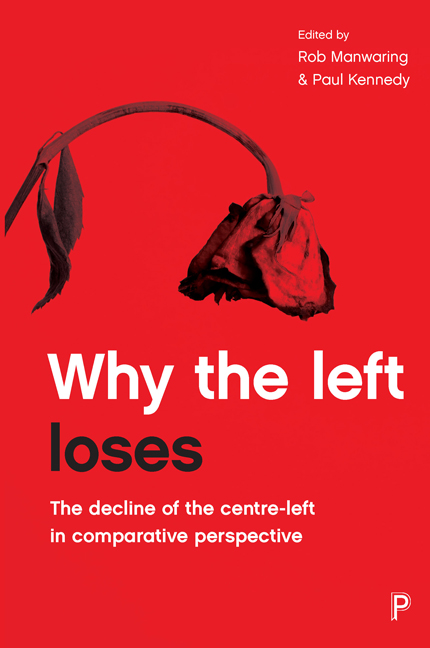Book contents
two - The case of the British Labour Party: back to the wilderness
Published online by Cambridge University Press: 08 April 2022
Summary
Introduction
For a brief period of time in the late 1990s and early 2000s, New Labour seemed to offer a distinctive model for the renewal (or, according to some critics, a betrayal) of social democracy. For 13 years New Labour had seemingly found an electorally successful model that also offered clues for a recalibration of the centre-left in the 21st century. Yet, at the 2010 general election Labour was ingloriously ejected from office, under the unfortunate leadership of Gordon Brown. Brown's tired and exhausted government, battered by the MPs’ expenses scandal, secured just 29 per cent of the vote, paving the way for David Cameron for the Conservative Party to secure office in coalition with the Liberal Democrats.
If the 2010 result was lacklustre for Labour, the 2015 general election, under the leadership of Ed Miliband, was far more damaging, in part, because it was unexpected. While Labour did increase its vote share to 30.4 per cent, Cameron secured a 12-seat majority. Since 2015, Labour has suddenly found itself in quite extraordinary territory, with the unexpected election of Jeremy Corbyn as party leader. In 2017, the Conservative Party was surging ahead in the polls, and Prime Minister Theresa May took a gamble and called a snap election for 8 June. Corbyn-led Labour performed better than was widely expected, and won an additional 30 seats, forcing a hung Parliament. Labour won 40 per cent of the vote, and the Tories clung to power with the support of the Democratic Unionist Party (DUP). Paradoxically, the mood in Labour was upbeat following the election, despite losing its third general election on the trot.
This chapter focuses on the period from 2010 to the 2017 general election to examine why the Labour Party is losing, and on its current trajectory, well may face a prolonged period of exile in the electoral wilderness. As Randall (2003) notes, there are multiple ways of examining centre-left political parties, including materialist, institutional, ideational and electoral strategies. Here, we adopt what Randall calls the synthetic approach, which integrates structural, institutional, ideational and agency factors.
- Type
- Chapter
- Information
- Why the Left LosesThe Decline of the Centre-Left in Comparative Perspective, pp. 25 - 38Publisher: Bristol University PressPrint publication year: 2017
- 1
- Cited by



